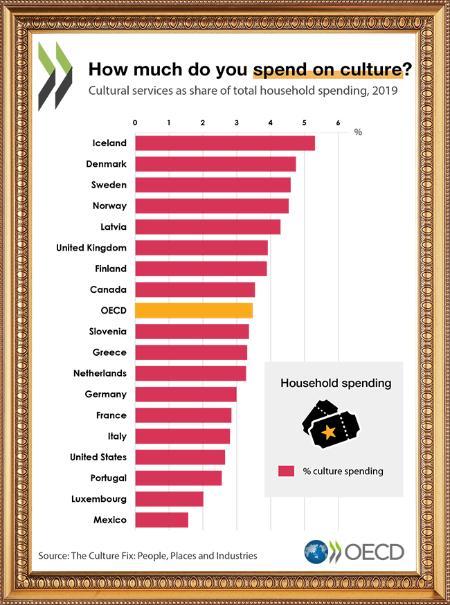Centre for Entrepreneurship, SMEs, Regions and Cities
The cultural and creative sectors can support the recovery despite being amongst worst hit by the COVID-19 crisis
OECD – Paris, 3 June 2022
The cultural and creative sectors can support the recovery despite being amongst worst hit by the COVID-19 crisis
|
A new OECD report “The Culture Fix: Creative people, places and industries” reveals the importance and potential of cultural and creative sectors as drivers of the crisis recovery: employment and business growth, social cohesion, and local regeneration. Cultural and creative sectors create jobs and economic activity. They generate tax revenues and enterprise turnover. According to OECD analysis, around 7% of firms in the business economy were from cultural and creative sectors. In 2020, cultural and creative employment accounted for up to one in twenty jobs in some OECD and EU countries and up to one in ten jobs in some cities and capital regions. They are highly skilled jobs. According to OECD analysis, 62% of cultural and creative employees hold a tertiary degree compared to 40% of the workforce generally. These jobs are “future proof” (10% at high risk of automation vs 14% in general workforce). On average about 40% of creative professionals work in other sectors (e.g. designers working in car manufacturing) driving innovation and creativity across the economy. In addition to being good business, culture makes our societies happier, healthier and inclusive. There is growing evidence that increased levels of cultural participation have positive effects on well-being and health as well as encourage social cohesion by supporting the integration and inclusion of marginalised groups. Culture and creativity also increase the attractiveness of places as destinations to live, visit and invest. The sector was growing strongly before the crisis. Enterprise growth in cultural and creative sectors outpaced growth in the business economy (18% compared to 12% on average across OECD). Cultural and creative employment growth outpaced overall employment growth in most countries (13.4% compared to 9.1% on average across OECD and EU countries). At the same time, the demand for culture is strong with household spending on recreation and culture growing by 18%, twice as fast as overall spending. This growth came despite falling investment from governments. Despite culture being in high demand, Government spending on cultural services fell to an average of 1.2 % of total government spending across the OECD. Yet the cultural and creative sectors have been profoundly impacted by the COVID-19 pandemic. The overall contribution to global gross value added (GVA) of the sector fell by around 21% between 2019 and 2020 as a result of the crisis. As highlighted by a recent UNESCO report 10 million jobs were lost worldwide in these industries. Additionally, per capita spending on recreational and cultural services dropped by about 30% in 2020 relative to 2019, on average. However, the impact of the pandemic has been uneven. Businesses with a strong digital content have often done very well, such as the gaming and music streaming services. While public support measures helped to cushion some of the blow, they were not always well adapted to the specificities of the CCS, such as workers who combine standard and freelance work. Some sectors are recovering quickly (e.g. music) while others (e.g. festivals and museums) will need more time to fully return to pre-crisis levels. Shoring up culture in the wake of COVID-19 will strengthen the recovery in terms of innovation and inclusion in OECD economies. Cultural and creative sectors drive innovation and ideas across the wider economy, through new product design, new production techniques, new business models, innovative ways of reaching audiences and consumers, and emerging forms of co-production. Speaking at the report’s launch, OECD Deputy Secretary-General Yoshiki TAKEUCHI said, “COVID-19 had a profound effect on the sector. This sector enriches our economies and societies, but all too often is the poor cousin of other economic sectors. It represents a policy blind spot. A sharper focus on the diverse needs of culture and creative industries will pay economic and social dividends for a stronger recovery”. The report says it is vital that governments take steps to level the playing field for workers, firms and organisations in these sectors, adapting policies on employment, social protection, innovation, and entrepreneurship. It also recommends that governments consider providing targeted advice and access to finance, and opportunities to connect culture and creative sector businesses with other sectors of the economy to foster growth and innovation.
Read more on the OECD report “The Culture Fix: Creative people, places and industries”
More information about OECD work on culture is available here www.oecd.org/cfe/leed/culture.htm
For further information, journalists are invited to contact Shayne MacLachlan at Shayne.MACLACHLAN@oecd.org or the OECD Media Office (news.contact@oecd.org). |
|
Related Documents
